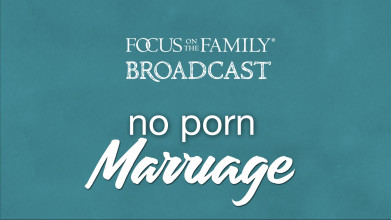Opening:
Excerpt:
Joyce Penner: And if you make a deal that this is a passionate kiss– I’m not leading you on– I just really want to get into this kiss. Then they keep kissing. And when we keep kissing, it keeps a little spark going in the brain, even after 54 years. You still can get a little spark.
End of Excerpt
John Fuller: Joyce Penner is with us again today on Focus on the Family with her husband, Dr. Cliff Penner, and they’ll share how you can increase the romance and enjoyment of physical intimacy in your marriage. And, of course, this is the kind of conversation that won’t be appropriate for younger listeners. Your host is Focus president and author Jim Daly and I’m John Fuller.
Jim Daly: We started a wonderful conversation last time about why God designed sexuality the way that He did and what He desires for us in that area when we are committed in a healthy marriage. And I am grateful to talk about it, because I’m tired of the world redefining the context of marriage and sexuality. And so often, we just give too much space to the world here. We need to start proclaiming the wonderful gift God has given us and we’re gonna continue the discussion today with Joyce and Cliff.
We addressed last time why it’s important for you, as a … as a woman to recognize that sex is also for you. So many women feel it’s their duty and we covered that and that this is something I … I’m not really into, but I will do that for my husband. Sometimes the shoe is on the other foot and we recognize that, that sometimes husbands …have a physical issue or they … they just have emotional difficulty and they’re the ones that are not inclined in the physical relationship.
If you missed the conversation from last time, get the download. Download the app for your Smartphone. You can listen to the program at your leisure. If nothing works, call us here at Focus on the Family and we’ll get it to you, because we believe in the message that we had for you last time.
Today we’re going to discuss how trauma or sexual addictions can negatively impact your relationship. But we’re gonna start where we left off with their formula for intimacy.
John: Yeah, let me just quickly interject that you’ll find the CD and download and the mobile app, other helps and the book by the Penners calledEnjoy: The Gift of Sexual Pleasure for Womenat our website. That’sfocusonthefamily.com/radio or if you’d like, give us a call. Our number is 800-A-FAMILY.
Body:
Jim: Cliff and Joyce, welcome back to Focus.
Joyce: Thank you. (Laughing)
Dr. Cliff Penner: Glad to be here as long as we can. (Laughter)
Jim: I, again, I thought our conversation last time was so helpful in so many ways. And to reframe it, we in the church, I think have been far too negative on physical intimacy. We kind of have, I think, followed centuries-old traditions within the church, where this is negative. This is something we don’t talk about. We do this thing, but we certainly don’t embrace it wholeheartedly. It’s just a…
Joyce: And that is how in some ways, we let the world teach our kids—
Jim: Correct.
Joyce: –about sex, rather than modeling and communicating the attitude that we believe is scriptural.
Jim: Right and you’ve come along as sex therapists, Christian sex therapists to say, “Hey, listen; God made this. He’s not surprised.” And you’ve written this wonderful book,Enjoy: The Gift of Sexual Pleasure for Women.And it’s really to you, women, to better understand how God has designed you to feel and to participate in a … in a way that’s healthy.
And we left off last time about that formula for intimacy, so I … I’m pretty sure thousands are tuning in today because we left you hanging about their formula. So, let’s get to it. What is that formula for intimacy?
Cliff: Well, we, just to set it up, we firmly believe that the best sexual life will grow out of an intimate relationship. And so, this is about the intimacy in the relationship part that kind of is the precursor to a joyful sex life.
Joyce: And the most important part of our formula is the 15-minutes-per day.
Jim: Of what?
Joyce: Of connecting with each other and it’s very prescriptive, because it does work. And what’s interesting is, we were teaching this from our clinical observation of what worked long before the sex and brain research came out. And what they …
Jim: And that reaffirmed what you were doing.
Joyce: It was so fun.
Jim: What does that connection look like though?
Joyce: And so, you start with just sitting down and you can set a timer if you’re concerned about [time].
Cliff: Yeah, often the man will say, “If we sit down to start talking, we’ll be here (Laughter) for two hours.” (Laughter) So, we—
John: Big disincentive.
Cliff: –we … yeah, so we say, set the timer for 15 minutes and when the timer goes off, you’re done.
Joyce: In fact, you can get these, you know, sand timers that go 15 minutes and I’ve given those to gifts for premarital couples with this … where they can turn it upside down and then it will end.
Cliff: When the sand runs out, the conversation’s ended.
Jim: Now do you ever find in your practice that sometimes that sounds so formulaic that you get some push back from your patients–
Joyce: Uh-hm.
Cliff: Un … un …
Jim: –who say, “Really?”
Cliff: Until they try it.
Jim: Until they try it.
Cliff and Joyce: Yeah.
Jim: And then it works, huh. So, there you go; there’s the challenge for you.
Cliff: So the first thing is the emotional eye-to-eye connection.
Joyce: And the reason for the eye-to-eye connection is that when we have eye-to-eye connection, our brain produces oxytocin, which is the bonding trust hormone. That’s why we’re to look in a baby’s eyes when we feed them or talk to them and that really is the bonding. And just share something positive. This isn’t the time to work out your daily schedule—
Jim: Budget.(Laughter)
Joyce: –or budget or your last fight. This is … and even couples will say, “But what if we’re mad at each other?” This is excellent to do when you’re mad at each other.
Jim: So, don’t walk away from it.
Joyce: No.
Jim: Go toward it.
Joyce: Force it … yourself to look into each other’s eyes and say something positive. And it doesn’t even have to be an affirmation of the other person, although those are good to build in. But it can be something positive that happened in your world that day.
Jim: Can I pry a little bit?
Joyce: Sure.
Jim: Because those that aren’t doing it probably don’t even know what to talk about. Between the two of you, what … what would it sound like?
Joyce: Okay, so um … we sure had a fun time with our friends this weekend, didn’t we? And that was being on Focus on the Family. That was pretty neat. You know, so it could be something …
Cliff: You … you … delighting in something together–
Jim: Right.
Cliff: –that we have shared.
Jim: Okay.
Joyce: Yeah.
Jim: You could talk about a good meal, a good experience–
Joyce: Yeah, yeah.
Jim: –something positive.
Joyce: Or kids … I really appreciated something you did, you know.
Jim: And you don’t end it with, “We could’ve done better if you would have …”
Joyce: No.
Cliff: Or—
Jim: Don’t ever say that. (Laughing)
Cliff: –or it might be, “I think you really good in that purple dress.” (Laughter) You know, that’s an affirmation, too.
Jim: Absolutely.
Joyce: Yeah, so it can be something positive, thought, feeling, affirmation. Then go to connecting spiritually. And wherever you … the person or the couple is in their spiritual journey, that will vary.
Cliff: Some couples will feel very comfortable praying together. Others, they don’t do that. And so, maybe they just want to read a … a one-page devotional for couples or—
Jim: Read Scripture together.
Cliff: –a Scripture, a Scripture together.
Joyce: Or have a flip calendar. There are many online that you can get. I’ll bet you probably have them here, that is a verse for the day—
Jim: Right.
Joyce: –or something like that.
Cliff: So that you make a little spiritual connection, two, three minutes, that’s all.
Joyce: And then, stand up and give each other a full-body, front-to-front hug for 20 seconds. (Laughter) And the reason is, that the brain in sex research has shown again that a 20-second hug produces a big surge of the oxytocin, the trust and bonding hormone.
Jim: I feel like going 25, 30.
Joyce: Okay. (Laughter) That’s allowed.
Cliff: It’s not a limit. You don’t have to stop at 20. (Laughter)
Joyce: But you have to go for 20.
Jim: It has to be heartfelt.
Joyce: Yes.
Jim: That’s what you’re saying–
Joyce: Yeah and—
Jim: –not so much the seconds.
Joyce: –give yourself into it and … and you can have … if it’s not comfortable and we say for couples who … and there’s some cultures who don’t look into each other’s eyes, if it isn’t comfortable to do this, start by having playful time with it. You know, google eyes (Laughter), a hug. You’re gonna hug me, you know. Play with it—
Jim: Right.
Joyce: –rather than get over the discomfort playfully.
Cliff: But you gotta get to the best part.
Joyce: Oh, yeah, then(Laughter) … then … and you don’t start with this and many men want to start with this. The woman is warmed up for this by the time you’ve done all this. Then you have afive- to 30-second passionate kiss.
Cliff: That is not designed to lead to a sexual experience.
Joyce: And let me tell you—
Cliff: It’s an end in itself.
Joyce: –and … and let me tell you why.Many couples over time kiss less and less passionately and less and less frequently, because this is how it goes. And when I tell this to the MOPS groups, the mothers’ groups, they all know it and laugh. He comes up to her and he wants to give her a kiss and in her mind she says, “Let’s see; do I want to have sex tonight? I’m not sure,” so then she turns the cheek. And if you make a deal that this is a passionate kiss, I’m not leading you on. This doesn’t have anything to do with whether we want to have sex tonight; I just really want to get into this kiss. Then they keep kissing. And when we keep kissing, it keeps a little spark going in the brain, even after 54 years. You still can get a little spark.
Cliff: It’s that hormone—
Joyce: That’s the dopamine.
Cliff: –dopamine surge—
Jim: Right.
Cliff: –that is the exciting surge.
Jim: So, I’m sorry… so I gotta ask you the question though, Cliff. You’ve never kissed Joyce with the idea that this could lead to something good?
Cliff: Of course. (Laughter) There’s … hope springs eternal. (Laughter)
Joyce: But it can’t be that that’s what he’s counting on.
Jim: Yeah, I did this, so why not this?
Joyce: Yes.
Cliff: Yeah.
Jim: Right, you don’t want to have that kind of …
Joyce: And we’re …
John: But there … there’s a big variation there between 5 and 30 seconds.
Joyce: Yeah.
John: Is there any …?
Cliff: Well, the reason we start with five is, that a lot of couples who haven’t been kissing at all, five is gonna be long.
Joyce: We used to say 30 and we realized in working with couples—
Cliff: That was way too much.
Joyce: –some couples have to start, when there’s been trauma and we’ll get to that … where kissing was misused, they may be able to do one second. And they … we give them permission to grow in this.
Cliff: Start where you can.
Joyce: Yeah.
Jim: Right, that’s what you’re saying.
Cliff: And then move it along.
Joyce: Yeah.
Cliff: The goal is 30 seconds.
Jim: Um … let me turn a little corner here. You want to empower women to lead sexually. Now, everybody just went what? What?
Joyce: Yeah.
Jim: Lead sexually, what do you mean by this? And what are the examples of the woman leading?
Joyce: Okay, first of all, the reason we’ll give is because her body, a woman is much more complex and ever-changing.
Jim: Yeah.
Joyce: Hormonally the change is going on and so, if she leads with her body, he’s much more predictable and simplistic, so to speak sexually. (Chuckling) And he can come along, but it’s hard for her to come along at his pace. And when he gets ahead of her, she gets farther and farther behind.
Jim: Uh.
Cliff: Because she feels so much pressure to get going and that pressure then makes her self-conscious and then that slows down her response rather than speeding it up. So, if the man can learn to take his cues from where the woman is in the process in terms of her level of arousal and readiness, then he is gonna be able to follow along with that. That’s what we mean by leading. We don’t mean dominating. We don’t mean—
Joyce: Or demanding.
Cliff: –or controlling. We’re just saying, man, pick up your cues from the woman and—
Joyce: And woman—
Cliff: –when you do that …
Joyce: –listen to yourself and go with what your body is telling you and lead in that way. So …
Jim: Yeah.
Cliff: Let me just say this. What’s behind all this is, that there’s nothing that turns on a man more than a turned-on woman.
Jim: Uh-hm.
Joyce: And so …
Cliff: That’s what makes him feel best about himself.
Jim: Right, that—
Joyce: And that’s what …
Jim: –affirmation, in reality.
Joyce: Right, that’s his affirmation. Whereas a woman’s affirmation is, him telling her how great she is. But his affirmation is her … so if he tells her how great she is, that turns her on. When she gets turned on, that affirms him and so, it’s a win-win.
Jim: Yeah.
John: So, back to this woman leading sexually.
Joyce: Yeah.
John: If she’s not getting the affirmation from him, what—
Joyce: It’s gonna be hard.
John: –can she do?
Joyce: Yeah, it’s gonna be harder. So, then we’ve gotta get him on board. (Laughter)
John: Well, how does she do that without saying, “Hey.”
Cliff: Well, what we often suggest is, take a book likeEnjoyand read it out loud together.
Jim: Yeah.
Cliff: This is one of the best ways to break into old sexual patterns, is to read a book out loud, not each going to your own corner and read it and talk about it as you go.
Joyce: We really want couples to hear this or whosever listening, because we can’t tell you how many times we assign couples to read it together and we always check. “Well, did you read it together?” “Well, no, she read her part and I read my part and we sorta talked about it.”
Jim: That makes that learning curve all the bigger, right–
Joyce: Oh.
Jim: –’cause you’re not hearing the other person’s part–
Joyce: That’s right.
Jim: –together, so they’re… yeah.
Joyce: It’s almost like having a third party there.
Jim: Right.
Joyce: And it’s a lot cheaper than going to therapy, let me tell you. (Laughter)
Jim: Let me ask you this. To the woman who doesn’t even know what she likes, how do you go back and relearn, a comment you just made, Cliff, to relearn those sexual patterns, or better healthier ones? How … how do you get back there? How … how does a woman, if you’ve been married, 10, 20, 30, 40 years, how do you undo kind of that … that learning that you’ve had, perhaps negative learning that you’ve had and undo that to put something healthier in there?
Joyce: And if they have again, a bit of a sense of humor they can go on, it helps. So, if they can say, “Okay, we’re doin’ it our old way. Let’s back up here. What are you feeling like? You know, what do you like?” “Oh, let’s kiss a little longer. Let’s try kissing this way.”
Jim: It’s probably interesting how little conversation couples have around this area, be … again, because—
Joyce: Absolutely.
Jim: –of the uncomfortableness of it.
Joyce: Absolutely.
Jim: I mean, you can be married for years and years and never have that simple—
Joyce: Never had that.
Jim: –discussion.
Joyce: And we have had couples come to us for therapy who are experts in the area of marital communication and have communicated wonderfully in every area of life except they’ve never talked about sex.
Jim: Yeah.
John: Well, we’re talking about sex today on—
Joyce: We sure are.
John: –on Focus on the Family. And our guests are Dr. Cliff and Joyce Penner. They are therapists who always generate a great response from our listeners. Our counseling team, Jim, you mentioned them earlier; they have so many conversations with couples who are struggling in this area of … of marriage. First, get the book by the Penners calledEnjoy: The Gift of Sexual Pleasure for Women. And then second, if you need help, give us a call. Our number is 800-A-FAMILY; 800-232-6459. Or online you’ll find these and other helps atfocusonthefamily.com/radio.
Jim: Cliff and Joyce, we’ve got about half the program left. I really want to dedicate some time to talking about those things that block intimacy and there are many. We hear from hurting women who would love to enjoy a healthy sexuality, but have found sex to be a deep area of pain because they have been wounded. There may be past trauma. They’ve experienced things that are beyond their control and there’s guilt associated to that. There’s many things that are hindering a healing in that area. Where do they start to find better footing in this area of intimacy in their marriage with past trauma, past hurt?
Cliff: Well, a foundation here is the …the belief that if the sexual life is gonna be good for a lifetime, it has to be as good for one as it is for the other.So, when we go with that mental set, then we can focus on finding out what the barriers are about and what we do with them.
Joyce: And for her, when there’s been woundedness, some kind of hurt that happened to her, that will have to be dealt with and that usually requires some outside help. And she needs to find a place where it’s safe to just talk it over, over and over again and maybe journal about it and write about it. Sometimes being in a group with other women who have experienced similar hurts, helps to release that.
But then once the hurt is dealt with, then she’s going to need to take steps gradually and enjoying that the sexual relationship with her husband is safe and that she can let herself be there and enjoy it for herself and take small steps.
Jim: Yeah.
Joyce: We always think … I think if we’re stuck somewhere, we always want to jump to the side where we want to be. And we have a little diagram inEnjoyof pouring steps like you pour concrete. And you let the first step dry and it’s a small step. And you have to be at that step till you … for example, let’s say we talked about kissing. Let’s say she was kissed inappropriately by a father or grandfather or whatever. And so, kissing just makes her cringe. She’s not gonna just be able to get in there and get passionate kissing.
Jim: It’s a negative thing to her.
Joyce: It’s a negative thing that was taken from her. So, experiencing God’s healing, through prayer and intervention and using God’s service.
Cliff: And conversations with her husband.
Joyce: Yes.
Jim: You know, let me ask you this from a spiritual perspective um … a physical intimacy perspective, which you have talked about these last couple of days. It’s so important to put those together—your sexuality and your spirituality. Why does a woman get trapped in that cocoon of not moving forward to better enjoy her physical intimacy, that space? Why does it become more comfortable to stay here where there’s pain and there’s a lack of fulfillment in her marital relationship with her husband, rather than wanting to move to a better place?
Joyce: Well, the way we—
Jim: Why?
Joyce: –understand it is, in fact, there’s a pattern for women who experience sexual abuse. And that’s that they can be often wildly, even promiscuously sexual outside of marriage where they feel in control. And it’s not being done to them. They typically shut down in marriage very quickly. Sometimes it happens already on the wedding night, sometimes during the honeymoon, for sure within the first few months.
And the way we understand it and it’s just our theory is, that now she feels trapped like she did in the abuse. And so, this is where the husband’s role is so important to … it really makes it difficult if she is feeling trapped and then he’s pursuing and demanding.
So, he’s really got to give her space and she has to learn that she is safe with him and to listen to herself and to free that part of herself and take it and own it as God’s gift to her to enjoy with her husband.
Jim: Yeah.
Joyce: And that takes time.
Jim: As sexual therapists, um … what are the top, three, four, five issues that confront you with, you know, 80 percent of the folks you see? What’s the typical thing?
Cliff: Well, in … in general there are all those things that have to do with lifestyle and …
Joyce: That’s most of us … us experience, that are just normal.
Jim: Having children.
Joyce: Having … yeah, yeah.
Cliff: All those things.
Joyce: Yeah.
Cliff: And then there can be relationship tension, you know, if he has an anger problem or she’s very controlling or … or she’s dominating or … or he is always escaping, getting out of there. Whatever those may be, so you gotta deal with the relationship issues. But as we get to the sexual part, the primary thing that … that goes on there for the woman often is fear.
Jim: Huh, describe that. What … what creates that kind of fear?
Joyce: Well, if there has been some kind of hurt or woundedness, then her anxiety goes up. Her fear triggers and the fear dominates rather than … she can’t feel any of those feelings or God-given sensations because the panic sets in, the fear, the … if it’s hurt, a physical hurt or other hurt.
Jim: And what would that fear come from? What … what would they be afraid of? I mean, that pain, that’s understandable.
Joyce: Yeah.
Jim: Are there … are there women who don’t experience that kind of trauma that still have fear?
Joyce: Sometimes, yes and sometimes that has to do with being warned that, you know, it’s gonna hurt.
Jim: This is awful.
Joyce: This is awful. He’s gonna use you. You know …
Jim: It’s all men want.
Joyce: It’s all men want, yeah.(Laughter) It is … it … the opposite kind of teaching we’re trying to give to women. It’s not for me. It’s just he’s gonna come after you; you’re not gonna have a chance. And so, that is … can create fear.
Jim: Wow, this has been terrific. You … you got one more thing you want to add to that?
Cliff: Oh, well, I … I wanted to get back to some of those other issues that people struggle with–
Jim: Hit it.
Joyce: Quickly.
Cliff: –women particularly. One is, if somebody was raised in an alcoholic or out-of-control home where somebody was emotionally–
Joyce: The home was volatile.
Cliff: –volatile, upset, angry home, where they felt they had to be in control, ‘cause the parents—
Joyce: As a child.
Cliff: –weren’t, but particularly in the alcoholic home, that will set a lot of women into a resistant mode. They will resist getting into the sexual experience and … and be very um … avoidant of it.
Joyce: Not just lack of desire, it’s really fighting it.
Jim: Yeah.
Joyce: They just fight it, fight it, fight it. When they finally give in, they get aroused, respond and they don’t like the feeling of having been out of control, because that doesn’t feel safe.
Cliff: Whenever we teach a seminar, we always have 10, 15 couples come up and say, “That’s us.”
Jim: Yeah.
Cliff: That’s exactly what happened.
Jim: Cliff and Joyce, I mean, this has been so good and it I think has helped literally thousands of people this time and last time and I know that’s your heart–
Joyce: Yes.
Jim: –because you want people to experience the fullness of Christ. And even to talk about one’s spirituality, along with one’s sexuality still makes the church so uncomfortable, but we have to remember this is the gift of God. And when this is healthy, so many good things are occurring in that marital bond. And … and really it impacts everything around them—their children, their community. That combination is so important.
And let me turn to you the listener. Maybe this conversation has touched a raw nerve for you, because you’re living in pain. This is an area of your marital relationship that is not healthy. We are here for you. Let us give you the resources and the tools to build that little concrete step that Joyce eloquently talked about. We’ll provide the concrete mix and you supply the water and let God dry that into a firm footing for you to move to the next step. And that’s why we are here.
Counselors on staff can help answer questions. They may get busy. With this type of program we get a … a huge response, so they’ll take your number and they’ll get back to you. But we want to put a resource into your hand at the very least. And Cliff and Joyce’s book,Enjoy: The Gift of Sexual Pleasure for Womenis a wonderful place to start.
John: And you’ll find that book and further details about our counseling team and other helps at focusonthefamily.com/radioor call us and as Jim said, if you need to talk to a counselor, we’ll take your name and number and they’ll get back to you just as soon as they can. Order the book and a CD of our conversation when you call 800-232-6459; 800, the letterAand the word FAMILY.
Jim: In fact, John, let’s do this. For a gift of any amount or if you can’t afford it, we understand that, just contact us. We will put that resource into your hands as our way of saying thank you for supporting the ministry that is trying to help so many people each and every day.
Cliff and Joyce, I’ve got a couple of additional questions I want to ask you and we’ll place that online, so for you, the listener, if you want to hear more, especially in this area where pornography is impacting your marriage, many people write to us and that’s occurring, we want to have that discussion offline. So, come to the Focus on the Family website. You can hear it there.
But as we end today, Cliff and Joyce, for that woman who has experienced that pain, she hasn’t had that fulfillment, what’s something she could do tonight to begin to engage in that area of pleasure that has not been there for her?
Cliff: The first thing we would encourage her to do would be to talk with her husband about what she heard on the broadcast today and … and tell him, “I couldn’t believe what they were talking about.”
Jim: (Chuckling) Right.
Cliff: “But they were a couple of points in there that fit exactly with me and I would … I’d like to tell you about that and then let’s see where we go from here.”
Joyce: And have a time set aside to talk about it. Don’t just do it when you crawl into bed at night.
Jim: Kinda undistracted time.
Joyce: Yeah, undistracted time, “Something got triggered in me that I realize I need to deal with and it happened in listening to this broadcast. So, let’s plan a time to talk.”
Jim: Well, again, it’s been great to have you with us. Thank you.
Cliff: Thank you for having us.
Closing:
John: And again, our guests have been Dr. Cliff Penner and his wife, Joyce and you’ll find follow-up resourcesatfocusonthefamily.com/radio.
Join us next time as we’ll hear from Laurie Polich Short about how you can reframe even difficult circumstances with a better perspective.
Teaser:
Laurie Polich Short: There were a lot of things I didn’t get to choose about my life. But this was the life that God gave me. And if I know the Lord, then I am saying I am willing to live this life that You have given me. You have written me into your story.
End of Teaser




















